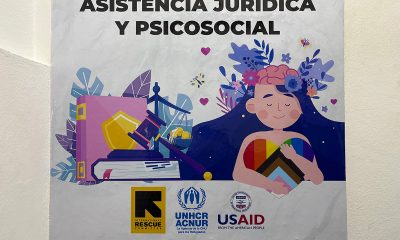World
LGBTQ youth find refuge at church-run shelter in El Salvador
Hogar Santa Marta opened in August
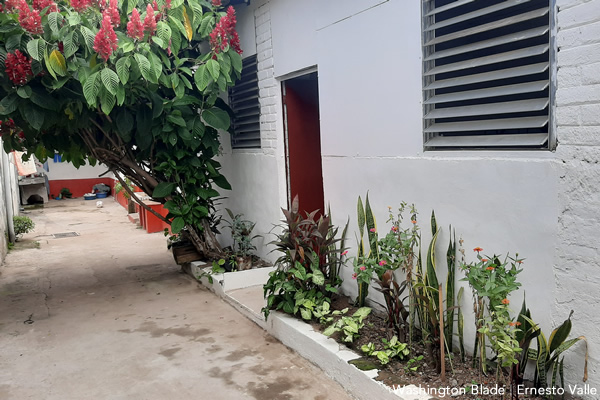
The Washington Blade published a Spanish version of this article on Oct. 25.
SAN SALVADOR, El Salvador — LGBTQ youth in El Salvador frequently face violence in their families and communities, and this abuse often happens with impunity. Many of these community members have either fled their homes or have been kicked out of them because they are not accepted for who they are.
A shelter that supports this vulnerable population has opened.
The Anglican Episcopal Church of El Salvador in 2009 created its Sexual Diversity Ministry, a pastoral mission that brings together LGBTQ people and their communities. The ministry has become a space in which everyone can live their faith free of discrimination.
Hogar Santa Marta opened in August, and is one of the ministry’s initiatives.
Bishop Juan David Alvarado of the Anglican Episcopal Church of El Salvador told the Washington Blade this project responds to human needs, especially when there is so much injustice. He said the shelter is a temporary home for young people as they work to solve their problems or find a way to better themselves.
“We as a church wanted to give an answer to LGBTQ people who have suffered human rights violations,” said Alvarado.
Hogar Santa Marta has already helped a number of LGBTQ young people. Three of them moved into the shelter and others have been able to receive assistance at their time of need.
“Our first option is that people do not necessarily have to experience family abandonment, so it is about achieving a conciliation with families,” explained Cruz Torres, coordinator of the Anglican Episcopal Church of El Salvador’s Sexual Diversity Ministry. He added the goal is to allow these young people to remain with their families.
Young people as of now primarily contact the shelter through its social media networks. A technical team evaluates the cases and then determines the way to proceed with each of them based on whether they are victims of violence or forced displacement or have been kicked out of their homes.
“This method of using networks has been deliberate in order to control our growth and not to have an immediate saturation,” said Hogar Santa Marta Director Eduardo Madrid, who explained the shelter’s opening was delayed because it was not ready to support young people who need support.
Helen Jacobo, the shelter’s psychologist, and Madrid created a protocol to determine the process to use with a person who is seeking help.
The technical team creates a profile of the person when it establishes contact with them and notes the situation in which they are living. It then passes this information along to the psychologist who will then schedule an interview.
“We can find out about their support networks, if they have a shelter or a safe place (to live) through a small interview,” said Jacobo.
‘I feel more complete and more secure’
Carlos, 25, sought the shelter’s support because of a series of the problems the pandemic made worse.
“I had to leave my house because of mistreatment, insults and beatings,” he recalled.
Carlos said he was relieved to arrive at a safe place, and even more so when he knew that he would have a lot of support.
“They have provided me with a lot of services, such as psychosocial support and I will get a job very soon,” he said with joy.
The shelter first offers its residents a place to live with access to regular meals and psychological therapy to address the traumas they have experienced. The shelter also accepts donations to provide residents with their basic needs.
“For my part I am very grateful, we have worked on ourselves as a person,” said Carlos with an assured look that conveys happiness from behind a face mask with a smile drawn onto it. He also expressed that he is grateful the shelter allowed him to live there with his pet that he took with him when he left his house.
Religion is not imposed upon the shelter’s residents, even though a church group created it.
“If you want to believe, you believe,” said Carlos. “They don’t impose religion on you.”
“I feel more complete and more secure,” he added, while saying that he has learned to put himself first. “That has been the most noticeable change that I have been able to have.”
With this self-empowerment in mind, the second stage for the shelter’s residents is to learn how to fight for their rights and know how to maintain them. Sustainable relocation, family awareness and creating a life plan are also part of this effort.
Alejandro, 23, has already been able to leave the shelter with the technical team’s support. He was able to get a job and find a new place to live.
He learned about the shelter from a friend who is a member of the Anglican Episcopal Church of El Salvador. The friend helped him present his case and he became the first young person to live in the shelter.
“Even though I was only there for a month, I felt the necessary support from the whole team,” says Alejandro.
He said he feels very involved with the shelter because he is its first successful case.
Alejandro said he had the opportunity during his first meetings to propose ideas about how the shelter can approach future cases. Alejandro added it was very rewarding to him that both the director and the psychologist took his thoughts into account.
Now that he has been able to find a job, Alejandro said he will do everything he can to remain stable. He will particularly rely on the psychological support the shelter still provides him, which is the third stage of its work. This support lasts for up to a year after admission and is supported through an alliance with NGO’s, the government and private companies.
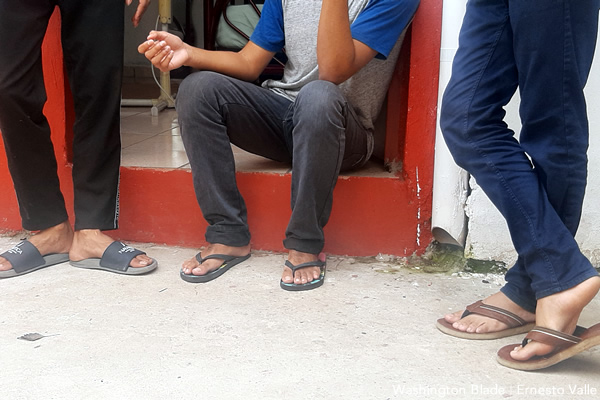
Strategic alliances
Hogar Santa Marta has made a variety of strategic alliances that allow it to carry out its work. One of them is with the U.N.’s International Organization for Migrants and specifically with its Integrated Responses on Migration from Central America project.
The shelter hopes to use this partnership to further develop a psychosocial program that will be able to help more vulnerable LGBTQ youth. Hogar Santa Maria hopes it can use some of these same strategies that IOM uses.
“Some of the instruments that they have specifically respond to psychological issues,” Jacobo explained.
Hogar Santa Marta’s programs have been made available to IOM in order to improve the way it views sexual diversity-related issues. They also hope to receive support for when they implement a group management program once more LGBTQ youth live in the shelter.
Rosalinda Solano, the national coordinator of the IOM project, said she is very interested in following up on the in-home work and hopes to enter into a collaboration with the shelter, such as the one that provides psychosocial support to LGBTQ people who have been returned to the country.
“We have also managed to identify other possible links, through profiles that can be linked to job opportunities,” she said.
Solano said the project seemed to be something very innovative and needed in the country, which does not have anything else. She hopes it will do something that has not been done before in El Salvador.
“It takes a fairly comprehensive approach, not it is just providing shelter,” she said.
There are two other shelters in El Salvador that specifically serve the LGBTQ community—ASPIDH ARCOIRIS TRANS’ Casa Trans and COMCAVIS TRANS’ Casa Refugio Karla Avelar—but they primarily serve displaced transgender women. Hogar Santa Marta is the first LGBTQ shelter in El Salvador that a church created.
“Young people see home with great hope for a new life,” said Alvarado.
The shelter can be found at Facebook as Santa Marta LGBT and on Instagram as @santamartalgbt. There is a link to a GoFundMe account there where donations can be made.
“We as a church recognize LGBTIQ+ people’s prophetic voice and we accept God’s call to care, direct and guide all people who face social injustice,” said Alvarado.
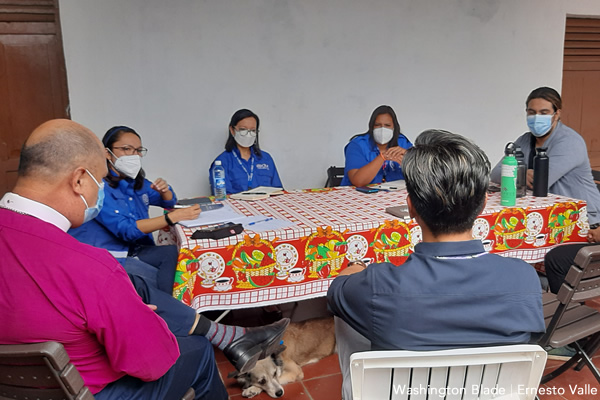
Chile
Transgender woman sues Chilean national police
Isabella Panes alleges she suffered harassment, exclusion after becoming ‘carabinera’

Isabella Panes in 2022 was celebrated as a symbol of inclusion.
Wearing an olive green uniform and a shy smile, she appeared in the media and on social media as Chile’s first trans female “carabinera” or national police officer. The Carabineros promoted Panes as a sign of openness, but that story has become a dramatic case of institutional discrimination.
Panes today faces the Carabineros in court.
She has denounced a series of systematic acts of exclusion, harassment at work, and violation of fundamental rights that she and her defense team maintains pushed her into a mental health crisis that almost cost her her life.
“My hope is that tomorrow we will be able to live in a world of equality for all. Just that we understand that we are human beings and we have to make life a lot easier for each other,” Panes told the Washington Blade during an exclusive interview.
Panes, 29, grew up in Laja in the Biobío region.
She dreamed of becoming a “carabinera” since she was a child, despite the fact that she faced discrimination because of her gender identity. After years of effort, surgeries and a difficult transition, Panes enrolled in the Carabineros Academy in 2021.
Panes faced the challenge of making her medical processes compatible with the physical demands of training. Even so, she graduated with good marks, and was recognized as part of the new institutional image the Carabineros wanted to project after the 2021 social unrest tarnished their image.
This institutional support disappeared after the media campaign.
Panes alleges she was marginalized from operational duties and relegated to administrative tasks, despite her interest in and training to patrol the streets like any other officers.
“I joined the Carabineros to serve, not to be a marketing decoration,” she said. “I was offered to be part of the change, but only if I kept quiet and accepted the mistreatment.”
The accusations against the Carabineros are serious: Constant mockery by colleagues, dissemination of private information about her personal life, invasive questions about her body and sexual orientation. Panes’s legal representatives said this abuse took place within a context where the institution did not take effective measures to protect their client.
The Carabineros Social Security Administration, known by the Spanish acronym Dipreca, also refused to cover her transition-related medical procedures, arguing they were “aesthetic,” despite medical reports that indicated their importance for Panes’s mental health and well-being.
Panes in January attempted to kill herself by suicide. She managed to survive after calling Chile’s 4141 mental health care number for help.
“They were killing me slowly, from the inside,” said Panes.
Panes has brought her case to the Supreme Court after a lower court ruled in favor of Dipreca’s decision to not cover her medical treatments.
Her legal team in a lawsuit has also accused the Carabineros of employment and systematic discrimination. Panes is seeking damages and institutional reforms.
“The Carabineros used Isabella to clean up its public image, but when it came to guaranteeing real rights, they abandoned her,” said Javiera Zúñiga, spokesperson for the Movement for Homosexual Integration and Liberation, a Chilean advocacy group.
“It is not enough to show up at the Pride march,” she added. “True inclusion is demonstrated in deeds, in daily dealings, in respect for the dignity of all people.”
Panes’s case starkly exposes the limits of diversity policies when there is no deep institutional commitment to implement them.
“I am no longer afraid,” said Panes, ”What happened to me cannot happen again. Not for me, but for all those who come after me.”
Brazil
US lists transgender Brazilian congresswoman’s gender as ‘male’ on visa
Erika Hilton has represented São Paulo since 2022

A transgender Brazilian congresswoman says the U.S. issued her a visa that listed her gender as “male.”
Erika Hilton on Wednesday wrote on her Instagram page that she requested a visa that would have allowed her to travel to the U.S. in order to participate in the Brazil Conference at Harvard University and the Massachusetts Institute of Technology.
The conference took place earlier this month.
“I was classified as ‘male’ by the U.S. government when I went to get my visa,” wrote Hilton, who added a visa she received from the U.S. in 2023 listed her gender as “female.”
Hilton is a Black travesti and former sex worker from São Paulo who won a seat in the Brazilian Congress in 2022. The Washington Blade spoke with Hilton shortly after her election.
“It is a big responsibility … but I feel very honored,” said Hilton. “I very much like to be able to be a representative for my people, and the more than 250,000 people who voted for me have confidence in me,” she said after she spoke at a rally in support of now Brazilian President Luiz Inácio Lula da Silva in a São Paulo square. “This demonstrates that our work has the potential to have a gigantic reach; where we can advance efforts to end death, poverty, misery, genocide that we have.”
President Donald Trump in his inaugural speech announced the federal government’s “official policy” is “there are only two genders, male and female.” The Trump-Vance administration has also banned the State Department from issuing passports with “X” gender markers.
Germany and Denmark are among the countries that have issued travel advisories for trans and nonbinary people who plan to visit the U.S. These warnings come ahead of WorldPride, which is scheduled to take place in D.C. from May 17-June 8.
Hilton said she is “not surprised” the U.S. issued her a visa with a male gender marker.
“I’m also not surprised by the level of hatred and fixation these people have with trans people,” she said. “After all, the documents I presented are rectified, and I’m registered as a woman, even on my birth certificate.”
Hilton further accused the U.S. of “ignoring official documents from other sovereign nations, even from a diplomatic representative.”
“At the end of the day, I’m a Brazilian citizen, and my rights are guaranteed and my existence is respected by our own constitution, legislation, and jurisprudence,” she said.
Editor’s note: Duda Salabert, another transgender Brazilian congresswoman, also said the U.S. listed her gender as “male” on her American visa.
United Kingdom
UK Supreme Court rules legal definition of woman limited to ‘biological women’
Advocacy groups say decision is serious setback for transgender rights
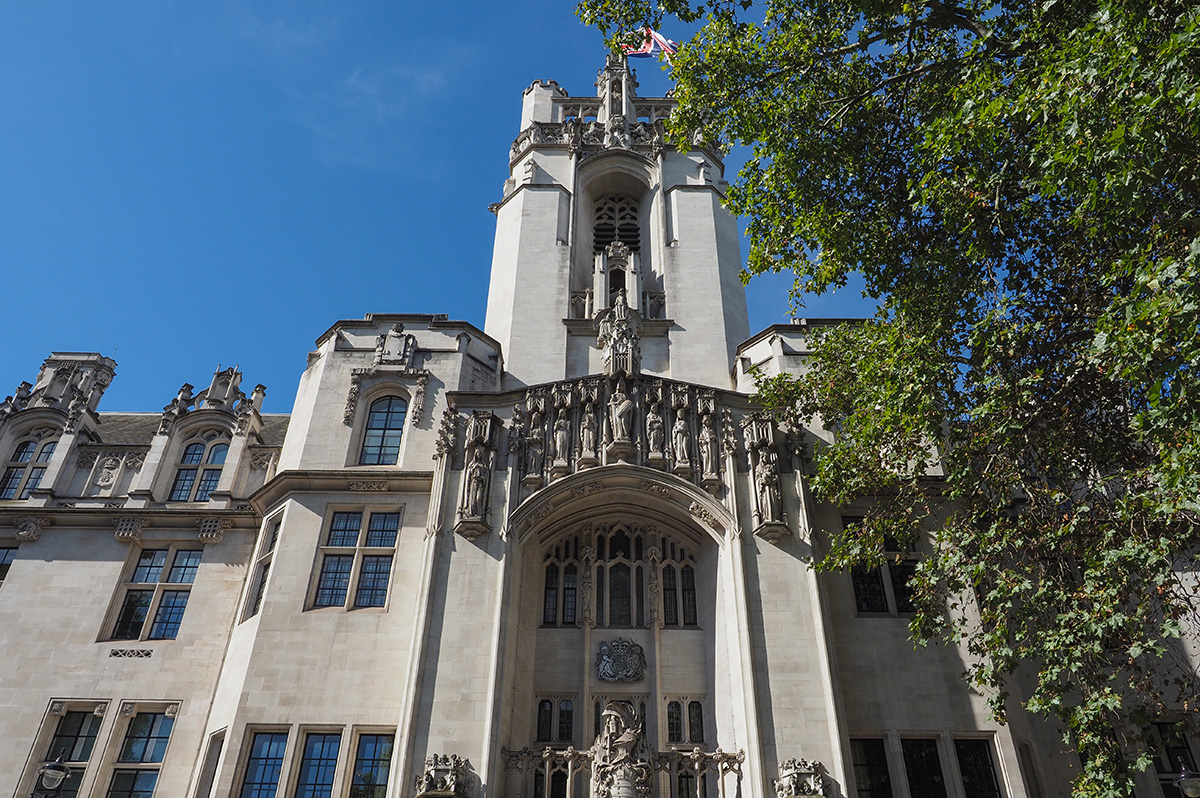
The British Supreme Court on Wednesday ruled the legal definition of a woman is limited to “biological women” and does not include transgender women.
The Equality Act that bans discrimination based on sexual orientation and gender identity took effect in 2010.
Scottish MPs in 2018 passed a bill that sought to increase the number of women on government boards. The Supreme Court ruling notes For Women Scotland — a “feminist voluntary organization which campaigns to strengthen women’s rights and children’s rights in Scotland” — challenged the Scottish government’s decision to include trans women with a Gender Recognition Certificate in its definition of women when it implemented the quota.
Stonewall U.K., a British advocacy group, notes a Gender Recognition Certificate is “a document that allows some trans men and trans women to have the right gender on their birth certificate.”
“We conclude that the guidance issued by the Scottish government is incorrect,” reads the Supreme Court ruling. “A person with a GRC (Gender Recognition Certificate) in the female gender does not come within the definition of ‘woman’ for the purposes of sex discrimination in section 11 of the EA (Equality Act) 2010. That in turn means that the definition of ‘woman’ in section 2 of the 2018 Act, which Scottish ministers accept must bear the same meaning as the term ‘woman’ in section 11 and section 212 of the EA 2010, is limited to biological women and does not include trans women with a GRC.”
The 88-page ruling says trans people “are protected by the indirect discrimination provisions” of the Equality Act, regardless of whether they have a Gender Recognition Certificate.
“Transgender people are also protected from indirect discrimination where they are put at a particular disadvantage which they share with members of their biological sex,” it adds.
Susan Smith, co-founder of For Women Scotland, praised the decision.
“Today the judges have said what we always believed to be the case, that women are protected by their biological sex,” she said, according to the BBC. “Sex is real and women can now feel safe that services and spaces designated for women are for women and we are enormously grateful to the Supreme Court for this ruling.”
Author J.K. Rowling on X said it “took three extraordinary, tenacious Scottish women with an army behind them to get this case heard by the Supreme Court.”
“In winning, they’ve protected the rights of women and girls across the UK,” she added.
It took three extraordinary, tenacious Scottish women with an army behind them to get this case heard by the Supreme Court and, in winning, they’ve protected the rights of women and girls across the UK. @ForWomenScot, I’m so proud to know you 🏴💜🏴💚🏴🤍🏴 https://t.co/JEvcScVVGS
— J.K. Rowling (@jk_rowling) April 16, 2025
Advocacy groups in Scotland and across the U.K. said the ruling is a serious setback for trans rights.
“We are really shocked by today’s Supreme Court decision — which reverses 20 years of understanding on how the law recognizes trans men and women with Gender Recognition Certificates,” said Scottish Trans and the Equality Network in a statement posted to Instagram. “The judgment seems to have totally missed what matters to trans people — that we are able to live our lives, and be recognized, in line with who we truly are.”
Consortium, a network of more than 700 LGBTQ and intersex rights groups from across the U.K., in their own statement said it is “deeply concerned at the widespread, harmful implications of today’s Supreme Court ruling.”
“As LGBT+ organizations across the country, we stand in solidarity with trans, intersex and nonbinary folk as we navigate from here,” said Consortium.
The Supreme Court said its decision can be appealed.
-

 District of Columbia4 days ago
District of Columbia4 days agoFinal push to raise funds, fill D.C. hotels as WorldPride nears
-

 District of Columbia3 days ago
District of Columbia3 days agoReenactment of 1965 gay rights protest at White House set for April 17
-

 Maryland4 days ago
Maryland4 days agoFreeState Justice: Transgender activist ‘hijacked’ Moore’s Transgender Day of Visibility event
-

 Hungary3 days ago
Hungary3 days agoHungarian MPs amend constitution to ban public LGBTQ events



